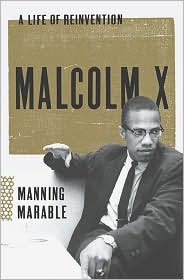 Today's guest post is from Sarah Lake of Sarah So Sincere.
Today's guest post is from Sarah Lake of Sarah So Sincere.I was in elementary school in the late 1980s and early 1990s at the height of Malcolm X’s rebirth in our consciousness. I had an over sized “X” t-shirt and would steal my older cousin’s red, black and green Africa medallion to complete the outfit. I eventually found a copy of The Autobiography of Malcolm X in my house and read it so, in 1992, when Spike Lee’s biopic came out, my 9-year-old self was fully prepped.
After repeatedly reading the autobiography and viewing the movie over the years, the legend of Malcolm X was firmly ingrained in my mind. To me, he was indeed, “our shining black prince,” our dignity and honor incarnate, a martyr who laid down his life for righteousness. New insights into the life of my hero through Manning Marable’s Malcolm X: A Life of Reinvention was overdue and highly anticipated. Marable’s reputation as a premier historian and this being his life’s work made the anticipation greater. “Oh, man. This is going to be good,” I thought when I cracked open the hardcover.
Marable makes his goal abundantly clear in the prologue: he’s on a myth busting mission. Finding discrepancies in The Autobiography, Marable’s goal is to expose the truth. Using myth busting as a foundation for this work proves itself problematic throughout this book. There are times when Marable not only contradicts Malcolm’s assertions about the details of his life but also contradicts first hand accounts from Malcolm’s own family. Other times, Marable’s allegations are not supported by any evidence in the text and you are left to make a decision: do I take Manning Marable’s word for it or not?
These instances do not make up the bulk of the book but they do coincide with the more salacious revelations in the text. These instances, though off-putting, would not deter me from recommending this book to one and all. Marable does a phenomenal job of putting the events of Malcolm’s life into context. Malcolm’s black nationalism and patriarchal attitudes did not develop in a vacuum. Examining his background and the various movements of the day, allow the reader to go deeper into Malcolm’s thought process and motives. In this way, Malcolm becomes less of a myth and more of a man.
This book is invaluable for its insight into Malcolm’s relationship with the Nation of Islam. His total dedication to Elijah Muhammed is downright scary at times and puts into perspective how much the split from the NOI affected him. Marable does a great job of detailing the inner workings of the NOI. I found myself both enthralled and disgusted by the cult. Stories of their organized thuggery and the fact that Malcolm was not the first person killed for crossing them were a surprise to me.
Another invaluable aspect of this book is the detailed account of Malcolm’s travels to Africa and the Middle East. Malcolm’s reception as a dignitary everywhere he went in these regions floored me in its contrast to his treatment in Europe and the U.S. His relationship with the orthodox Muslim world and how it lead, in part, to his demise was another fascinating new detail.
Some people have charged that Marable did “the man’s” bidding in attempting to disparage Malcolm’s legacy but I came away from this book with his legacy and my love for him very much intact. Marable, having died shortly before the release of this book, is not here to defend his scholarship but I thank him for this work. Despite my misgivings about some of the allegations, this book is a shining testament of Malcolm’s depth, complexity and dedication to growth, not only for himself but also for us.

No comments :
Post a Comment